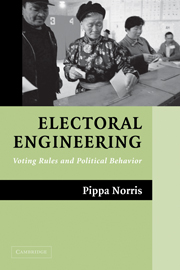Book contents
- Frontmatter
- Contents
- List of Tables and Figures
- Preface
- Electoral Engineering
- PART I INTRODUCTION
- PART II THE CONSEQUENCES FOR VOTING BEHAVIOR
- PART III THE CONSEQUENCES FOR POLITICAL REPRESENTATION
- 8 Women's Representation
- 9 Ethnic Minorities
- 10 Constituency Service
- PART IV CONCLUSIONS
- Bibliography
- Notes
- Index
8 - Women's Representation
Published online by Cambridge University Press: 05 September 2012
- Frontmatter
- Contents
- List of Tables and Figures
- Preface
- Electoral Engineering
- PART I INTRODUCTION
- PART II THE CONSEQUENCES FOR VOTING BEHAVIOR
- PART III THE CONSEQUENCES FOR POLITICAL REPRESENTATION
- 8 Women's Representation
- 9 Ethnic Minorities
- 10 Constituency Service
- PART IV CONCLUSIONS
- Bibliography
- Notes
- Index
Summary
The first part of this book examined how electoral rules influenced the strategies adopted by parties and the behavior of the mass electorate. But so far I have not considered the potential impact of rational-choice institutionalism and cultural modernization upon political representation. Debates about electoral reform have revolved around the practical impact of changes to the status quo, including how to achieve social diversity in legislatures so that parliaments look more like the people they serve. Recent decades have witnessed growing demands for the inclusion and empowerment of women in elected office, as well as a stronger voice for ethnic minorities (as discussed fully in the next chapter). Feminist theorists suggest that the presence of women leaders facilitates the articulation of different perspectives on political issues, where elected representatives are not just “standing as” women but also “acting for” women as a group. An accumulating body of evidence in North America, Scandinavia, and Western Europe suggests that women legislators do, indeed, raise distinctive concerns and issue priorities. If so, then their under-representation in parliament may have important consequences for the public policy agenda and for the articulation of women's interests, as well as for the legitimacy of democratic bodies.
As is well known, today women continue to be strongly under-represented in elected office. This pattern persists despite trends in the home, family, school, and workforce that have been transforming women's and men's lives during the postwar era, as well as despite the growth of the second wave feminist movement strengthening demands for gender equality in politics.
- Type
- Chapter
- Information
- Electoral EngineeringVoting Rules and Political Behavior, pp. 179 - 208Publisher: Cambridge University PressPrint publication year: 2004
- 1
- Cited by



